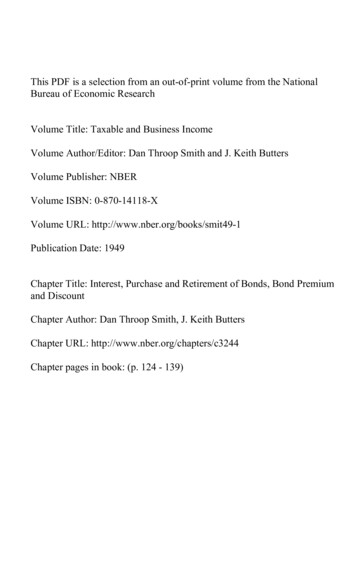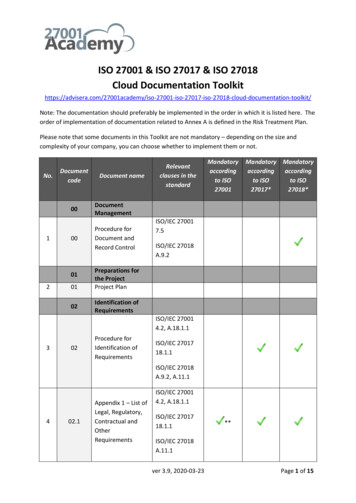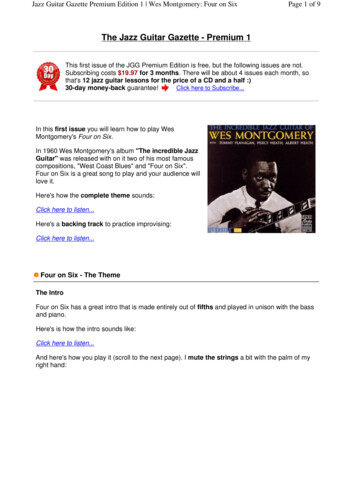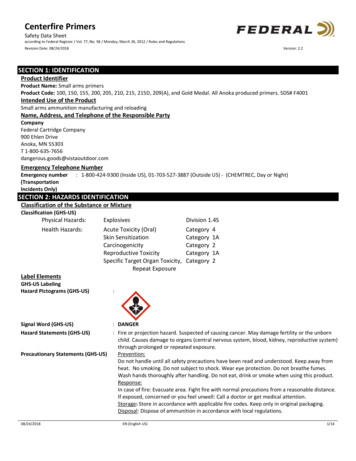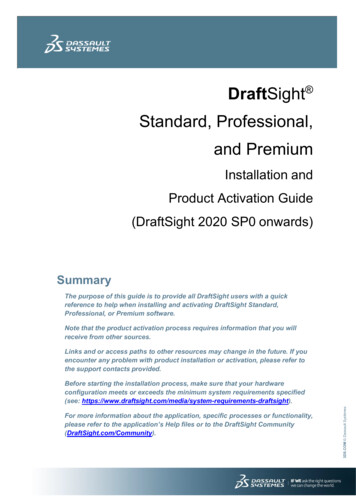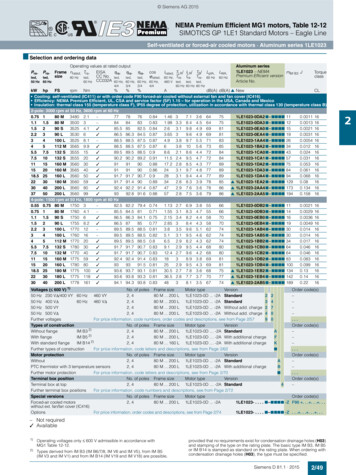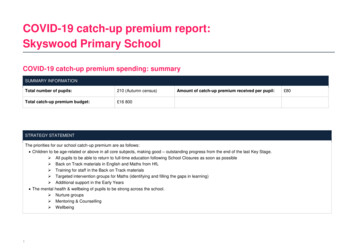
Transcription
COVID-19 catch-up premium report:Skyswood Primary SchoolCOVID-19 catch-up premium spending: summarySUMMARY INFORMATIONTotal number of pupils:210 (Autumn census)Total catch-up premium budget: 16 800Amount of catch-up premium received per pupil:STRATEGY STATEMENTThe priorities for our school catch-up premium are as follows: Children to be age-related or above in all core subjects, making good – outstanding progress from the end of the last Key Stage. All pupils to be able to return to full-time education following School Closures as soon as possible Back on Track materials in English and Maths from HfL Training for staff in the Back on Track materials Targeted intervention groups for Maths (identifying and filling the gaps in learning) Additional support in the Early Years The mental health & wellbeing of pupils to be strong across the school. Nurture groups Mentoring & Counselling Wellbeing1 80
Barriers to learningWe use the following data sources to help identify barriers to attainment at Skyswood:Internal assessment and reporting software (SIMS)Pupil Progress MeetingsParent consultationAttendance recordsGuidance from expertsBARRIERS TO FUTURE ATTAINMENTAcademic barriers: Periods of remote learning as a result of National Lockdown (March 2020 and January 2021) and self-isolation have resulted in gaps inlearning as follows:AKey Stage 1 have identified problems with sentence structure, holding a sentence and the use of full stops and capital letters In English.Gaps in Maths have focused on knowledge and understanding of the different strategies.BEarly Years identified gaps in PSED, particularly relating to independence (eg. toileting, putting on coats) and PD (fine motor control, pencil grip).Assessments post-lockdown (March 21) show children are significantly behind where they would usually be, with the foundations of their learning havingbeen compromised. Attainment for the Reception cohort (2020-21) was low at Baseline and, despite making expected progress over the year, they arenot predicted to achieve the levels of GLD that we would normally achieve.CKey Stage 2: Lower KS2 identified gaps in reading, relating to sounding out and blending, fluency, expression and comprehension. All children have shown gaps in the understanding and application of methods/strategies and ‘number talk’ within Maths. Gaps in writing seemed to centre around punctuation and sentence structure.ADDITIONAL BARRIERS2DWellbeing of pupils across the schoolEShared use of devices when whole families are isolating or in Lockdown.
FStaffing Constraints due to the pressures of supplying ‘blended learning’ and members of staff self-isolatingPlanned expenditure for current academic yearHow we plan to use the catch-up premium to improve classroom pedagogy, provide targeted support and support whole-school strategies.Quality of teaching for allActionIntended outcomeand success criteriaPurchase Back onTrack training materialsfrom HfL for Englishand Maths.All staff to teach fromthis scheme of workfor the requiredduration in order toclose the gaps andcatch up on missedpedagogy.Buy in training from theHfL team.During the partial reopening of schools inJune 2020, teachingassistants to beresponsible for thedelivery of teachingand learning in YR, Y1and Y6.3What’s the evidence andrationale for this choice? All pupils in YR, Y1and Y6 to be able toreturn to full-timeeducation for the finalhalf term followingthe first schoolclosure (June & July2020) HfL have adjusted EssentialMaths which we already buyinto – they have taken outunits which are not asimperative and replacedthem with missed learningfrom the year before.We use HfL Englishplanning, which again hasbeen replaced with theseunits to close the gaps andprovide opportunities forassessment.Each returning year group tobe split into 2 bubbles of 15children in keeping withGovernment guidance.The teaching assistant towork closely with the classteacher to deliver theplanned curriculum andprovide developmentalfeedback to children.How will you make sure it’simplemented well? All teaching staff to receivethe training on how toimplement and use theresources (75 min sessionwith Penny Slater & DavidCooke- 3rd Nov, 3:45pm) Resources will be availablefor staff to purchase tosupplement their teaching Work scrutiny,assessment/Pupil ProgressMeetings Learning walks Discussions with the yeargroup team Pupil Progress MeetingsStaff leadWhen willyou reviewthis?Heidi Lewis(English)End of theSpring TermMia Harvey(Maths)JaneCarmichaelJane FoxTeresa MorrishEnd ofSummer Term2020
To support theemotional wellbeing ofall pupils in the schoolthrough the HappyHuman Project.Children can managetheir own emotionsand react in anappropriate way tochallengingsituations.Last year, Charlotte Clark delivereda one-off workshop during FeelingGood Week 2020 which was verywell received by staff and pupils. Shehas released a 5-week packageleading up to Feeling Good Week2021 which we felt would benefitchildren following the challenges ofschool closure.All sessions can be accessedremotely (all parents and staff toreceive own login) and therefore willsupport wellbeing during lockdownitself.Kate UptonBudgeted cost: 2470 (materials) 252 (training) 40 (books) 1800 staffing costs 280Pupil andparentfeedbackduring SpringTerm.Total 4842Targeted support4ActionIntended outcomeand success criteriaWhat’s the evidence andrationale for this choice?How will you make sure it’simplemented well?Staff leadWhen willyou reviewthis?To support theemotional wellbeing ofidentified childrenthrough counselling(Helen Uwins),Mentoring & NESSIEPlay TherapyFor the childrenidentified to receivethe support theyrequire to cope withtheir own personalchallenges.Covid-19 and the resultinglockdowns and school closure havecaused immense pressure onfamilies. This has impacted themental health & wellbeing of some ofour pupils. Some pupils have beenidentified for support exceeding thatwhich we can provide within schooland external professionals canimplement the support required.Feedback from the professionalsregarding the success of sessions(within keeping of confidentialityagreements).Bob BridleVistaNESSIEEnd of theSummer Term2021 (delayeddue to secondschoolclosure)
5To provide NurtureGroups to support theemotional resilienceand wellbeing ofidentified pupilsfollowing the closure ofschools.To provide a safespace for the sharingof worries, so thatchildren learnstrategies to deal withproblems andunderstand that thereare people they cantalk to.Pupil Progress Meetings used toidentify children strugglingemotionally as well as childrenfinding it difficult to interact positivelywith their peers. Nurture groupsassess social and emotional needsand give the necessary help toremove the barriers to learning. Pupil Progress Meetings Feedback from children Regular discussionsbetween provider and classteachersTo provide anexperienced teacherfor the currentReception cohort asthey enter Y1, toensure that acceleratedprogress can be madeto make up for thedisrupted beginning totheir education.For the class to reachapproximately theNational average bythe end of Year 1 inMaths, Reading andWriting.Emily Jones is an outstandingteacher with a wealth of experienceteaching both EYFS and Year 1 atSkyswood school. She will be able tofill the gaps in the children’sunderstanding, catering for missedopportunities in Early Years, andmove them on in their learning inKS1. She already has a goodworking relationship with the Y1 TA. Supply days will beorganised in the SummerTerm to support the teachergetting to know the cohort. Transition meetings to beheld with current Receptionstaff. Transition Day on 8th July tointroduce new class to Year1. KS1 meetings with MH andLS to introduce EJ to newmaterials – Essential Maths,PA Plus, Back on Track.Lisa Spiller/Caroline RichEnd of theSummer TermLisa SpillerPupil ProgressMeetings eachterm.Mia HarveyJenny KerrAppraisalMeetings
To provide additionalsupport to Early Years(Reception) to closegaps in PSED, PD andother identified areasfor development.For children to makegood-outstandingprogress fromBaseline and achievein line with Nationalstandards (pre-Covidexpectations) in thethe EYFSP.Assessment in September showedsignificant gaps in PSED(independence, putting on coats,toileting, self-care), PD (fine motor,pencil grip) as well as some areas ofMaths and CL.An extra member of staff has beenprovided to implement the Catch-Upand interventions necessary - eg.WellComm, 1:1 readingopportunities, Maths intervention(next steps and filling the gaps),Busy Fingers, increasingindependence (coats, changing,toileting). Regular liaison betweenAdrienne Hinrichs and theclass teacher. Pupil Progress Meetings Internal AssessmentJenny KerrBudgeted cost: 3000 – CounsellingPlay Therapy tbcMentoring 600 – 10 week programmeNurture Groups: 1176 (2 hours per week)Y1 Staffing 2775Reception Intervention 4281 (an extra 9 hours per week)Termly review 11 832Other approaches6ActionIntended outcomeand success criteriaWhat’s the evidence andrationale for this choice?Leadership Teamtraining in thepedagogy & practice ofRemote Learning.SLT to be fullyinformed as to thebest practice forRemote Learning.This will furtherinform our RemoteLearning Plan and bedisseminated to staffduring staff meetings.HfL webinar will include a series ofinputs from a range of Hertfordshireschools sharing good practice andlearning points. It will also collateand disseminate some helpfulsummaries of key research andevidence as well as wider bestpractice available.How will you make sure it’simplemented well? Review of Remote LearningPlan with the Governors.Staff leadWhen willyou reviewthis?Bob BridleEnd of theSpring TermLisa SpillerCaroline Rich
Budgeted cost: Webinar 50ADDITIONAL INFORMATION7 50
independence (coats, changing, toileting). Regular liaison between Adrienne Hinrichs and the class teacher. Pupil Progress Meetings Internal Assessment Jenny Kerr Termly review Budgeted cost: 3000 – Counselling Play Therapy tbc Mentoring 600 – 10 week programme Nurture Groups: 1
